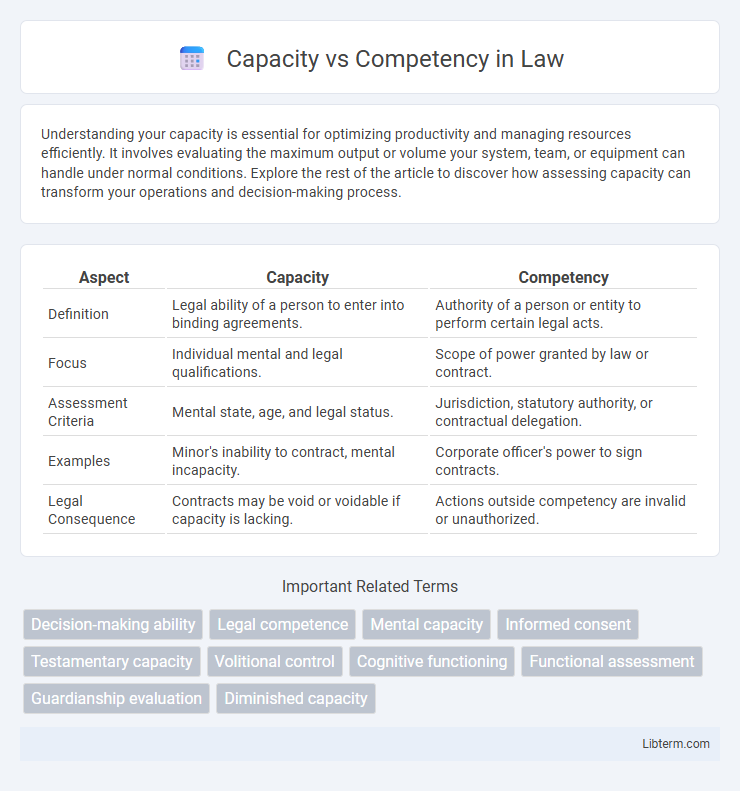Understanding your capacity is essential for optimizing productivity and managing resources efficiently. It involves evaluating the maximum output or volume your system, team, or equipment can handle under normal conditions. Explore the rest of the article to discover how assessing capacity can transform your operations and decision-making process.
Table of Comparison
| Aspect | Capacity | Competency |
|---|---|---|
| Definition | Legal ability of a person to enter into binding agreements. | Authority of a person or entity to perform certain legal acts. |
| Focus | Individual mental and legal qualifications. | Scope of power granted by law or contract. |
| Assessment Criteria | Mental state, age, and legal status. | Jurisdiction, statutory authority, or contractual delegation. |
| Examples | Minor's inability to contract, mental incapacity. | Corporate officer's power to sign contracts. |
| Legal Consequence | Contracts may be void or voidable if capacity is lacking. | Actions outside competency are invalid or unauthorized. |
Understanding Capacity and Competency: Key Definitions
Capacity refers to an individual's ability to perform tasks based on physical, mental, and emotional resources, encompassing potential and capability over time. Competency is defined as the demonstrated skills, knowledge, and behaviors required to effectively execute specific job functions or roles. Understanding both capacity and competency is essential for workforce development, talent management, and aligning employee potential with organizational goals.
Legal Perspectives on Capacity vs Competency
Legal perspectives distinguish capacity as the general ability to understand and make decisions, whereas competency refers to a court's formal determination of an individual's mental fitness to participate in legal proceedings. Capacity is often assessed in medical or psychological contexts, focusing on cognitive abilities related to specific decisions, while competency involves legal standards to ensure fair trial rights or contract validity. Courts rely on expert evaluations to establish competency, impacting legal responsibilities and protections under statutes like the Mental Health Act or guardianship laws.
Core Differences Between Capacity and Competency
Capacity refers to an individual's potential or ability to perform tasks based on innate talents or learnable skills, while competency encompasses the demonstrated skills, knowledge, and behaviors required to execute specific job functions effectively. Capacity is often measured by cognitive abilities, physical stamina, and emotional resilience, highlighting what a person is capable of achieving. Competency integrates both capacity and experience, reflecting proven performance and mastery in a defined role or set of responsibilities.
Assessing Capacity in Medical and Legal Contexts
Assessing capacity in medical and legal contexts involves evaluating an individual's ability to understand, appreciate, and make informed decisions regarding their health or legal matters. Capacity focuses on practical decision-making capabilities at a specific time, whereas competency is a broader, legal determination often made by a court. Accurate assessment requires specialized tools and expert judgment to ensure decisions respect autonomy while protecting vulnerable individuals.
Evaluating Competency: Criteria and Procedures
Evaluating competency involves assessing specific skills, knowledge, and behaviors essential for effective job performance through standardized criteria such as technical expertise, problem-solving abilities, and interpersonal communication. Procedures include competency-based interviews, practical assessments, and 360-degree feedback to ensure a comprehensive evaluation across different performance dimensions. Utilizing validated measurement tools and consistent benchmarking against industry standards enhances the accuracy and reliability of competency evaluations.
Factors Influencing Capacity and Competency Determinations
Factors influencing capacity determinations include cognitive abilities, emotional stability, and understanding of relevant information, all critical for assessing decision-making capabilities in legal or medical contexts. Competency evaluations prioritize skills, knowledge, and performance levels necessary to execute specific tasks or roles effectively. Both assessments require consideration of environmental, psychological, and situational variables to ensure accurate and fair judgments.
The Role of Healthcare Professionals in Capacity Assessment
Healthcare professionals play a critical role in capacity assessment by evaluating a patient's ability to understand, retain, and weigh relevant information to make informed decisions. They use structured tools and clinical judgment to differentiate between capacity, which refers to a person's functional decision-making ability, and competency, a legal determination made by courts. Accurate capacity assessments ensure patient autonomy is respected while safeguarding against risks associated with impaired decision-making.
Judicial Processes in Determining Competency
Judicial processes in determining competency emphasize evaluating an individual's mental capacity to stand trial, ensuring they understand legal proceedings and can participate in their defense. Courts rely on expert testimony from psychologists or psychiatrists to assess cognitive and functional abilities critical for decision-making. This competency assessment balances legal standards with clinical insights to protect defendants' rights while maintaining trial integrity.
Implications of Capacity and Competency in Decision-Making
Capacity determines an individual's legal ability to make decisions, ensuring they understand and appreciate the consequences, while competency assesses cognitive and functional skills necessary for rational decision-making. In legal and clinical contexts, lacking capacity can lead to decisions being overridden or deferred to guardians, affecting autonomy and rights. Competency evaluations influence the allocation of responsibilities and resources, guiding tailored interventions that optimize decision outcomes and protect vulnerable individuals.
Enhancing Capacity and Supporting Competency in Practice
Enhancing capacity involves developing the resources, infrastructure, and organizational capabilities necessary to achieve long-term goals, while supporting competency centers on improving individual skills, knowledge, and behaviors required for effective performance. Investing in training programs, access to technology, and process optimization strengthens capacity, creating an environment where competencies can be effectively applied. Organizations that balance capacity building with focused competency development foster sustainable growth and improved operational outcomes.
Capacity Infographic

 libterm.com
libterm.com